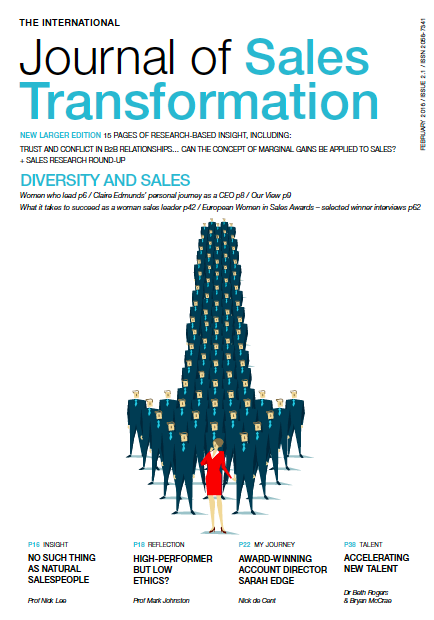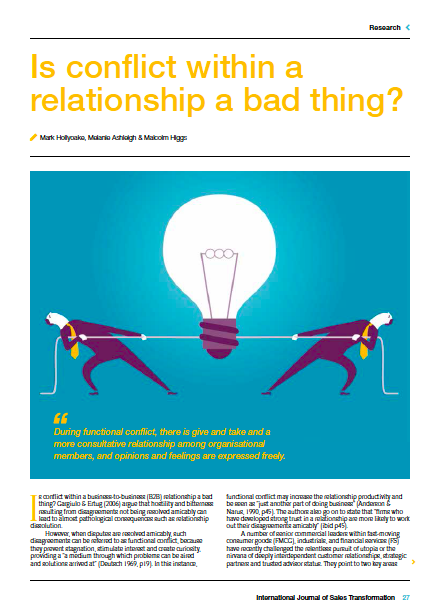Is conflict within a B2B relationship a bad thing? Part 3 of 3
In our third blog on Conflict within Business to Business (B2B) relationships we focus on ways organisations can prevent relationships from becoming over-dependent.
This blog has been published in The Journal of Sales Transformation – scroll down to read the full article.
The development of creative and /or healthy conflict and tension mediates against the development of over-dependence through excessive trust, whilst also creating opportunities to enhance the relationship through shared experiences. The accumulation of war stories, jointly overcoming adversity and shared experiences is a key trigger to build trust, loyalty and relationship development.
Creating ‘healthy’ conflict:
- Develop the relationship mechanisms that extend the relationship beyond one person and include others that balance the relationship and ensure objectivity. Extend beyond the gatekeeper through other stakeholders brought together through a stakeholder map or plan.
- Explore relationship quality with customer contacts that move beyond the principal contact.
- Develop robust formalised relationship monitoring and review process. Don’t make it too onerous or it will add cost, complexity and sales people are unlikely to fully comply. However it needs to be enough to call the key contacts to account and keep the customer management team on their toes.
- Review mechanism when performance shortfalls occur or targets/forecasts are missed in consecutive periods.
- Customers can take a supplier’s willingness to undertake what the supplier perceives to be relationship enhancing activities – such as information provision, analysis and insight generation – for granted. Over time, these harden into obligations and become a significant drain on resources, cost to serve and customer profitability, e.g.,one customer reported a supplier undertaking detailed analysis and insight generation on its behalf through a dedicated team of five. These individuals declined to share their knowledge as in their eyes ‘it breached customer trust’. A regular cost to serve and cost benefit analysis ensures activities of this kind remain equitable.
- Team management and monitoring of large customers through frequent visits, formalised customer review process overlaid with the relationship quality ensure early indicators are spotted and corrective action put in place.
- The rotation of the wider customer team over a five year time frame allows positive trust building elements to be developed, embedded and successfully passed on for onward development without compromising the overall relationship
- The enabling platform of customer information held within accessible systems breaks over-dependence on one or two individuals for all the customer information, and provides the platform for wider cross-functional involvement.
Have a view on this? Tweet to @customerattune or Tweet to @MarkHollyoake
Read the full article featured in The International Journal of Sales Transformation by clicking on the images below.
If you’d like to know more about The International Journal of Sales Transformation, click here.
- Excessive Trust – When Trust Goes Wrong - October 29, 2024
- Identification Based Trust - October 21, 2024
- Introducing Knowledge Based Trust - October 15, 2024



